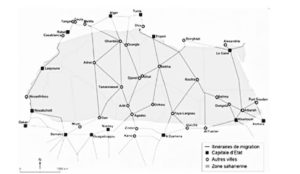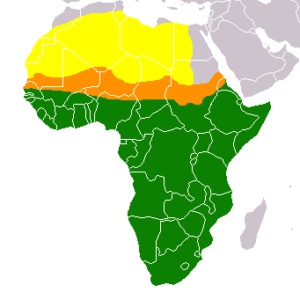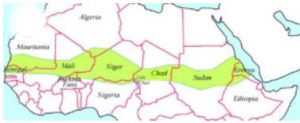
Source : J. Brachet, A. Choplin, O. Pliez, 2011 ; Crédit : http://geoconfluences.ens-lyon.fr, ENS-Lyon / DGESCO
And what if the G5 Sahel countries difficulties were related to their borders management? This impression prevails when one looks at the conclusions of the recent G7 Summit, held in Biarritz, France, from 24 to 26 August 2019. By consensus, German Chancellor Angela Merkel, French President Emmanuel Macron and President Rock Marc Christian Kaboré of Burkina Faso, have called for a redefinition of a « security perimeter », in the face of « the extension of the terrorist threat in the Sahel ».
In others words, the new security commitment would involve, in the G5 Sahel defense efforts, the Gulf of Guinea countries, including Senegal, Côte d’Ivoire and Ghana. Will that be enough, to curtail the terrorist wave that inflicts so much suffering to the Sahel populations?
Read More
 In the Sahel, where an armed conflict has been ongoing since 2012, today, the greatest risk is »the war of each against all ». The widespread civil war situation evoked by Thomas Hobbes in the 17th century looms over the Sahel and already exists in Libya.
In the Sahel, where an armed conflict has been ongoing since 2012, today, the greatest risk is »the war of each against all ». The widespread civil war situation evoked by Thomas Hobbes in the 17th century looms over the Sahel and already exists in Libya.

 The December 10, 2019 terrorists’ assault on Inatès, an advanced military post on Niger border with Mali, has caused the loss of seventy-one (71) soldiers. The terrible toll provoked anger in this country. Among the reactions, those of important actors of the country political life voicing their doubts on the usefulness of the foreign military bases installed in the Sahel. In particular, they questioned the armed forces of the host countries lack of information on the jihadists’ whereabouts at critical times.
The December 10, 2019 terrorists’ assault on Inatès, an advanced military post on Niger border with Mali, has caused the loss of seventy-one (71) soldiers. The terrible toll provoked anger in this country. Among the reactions, those of important actors of the country political life voicing their doubts on the usefulness of the foreign military bases installed in the Sahel. In particular, they questioned the armed forces of the host countries lack of information on the jihadists’ whereabouts at critical times. In Burkina Faso, Mali and Niger, civil society organizations (CSOs), opposition parties, as well as workers and students’ unions are increasingly protesting against foreign forces presence in their countries. These attitudes stem from several motivations: respect of the Independence spirit that had led the new States, such as Upper Volta (now Burkina Faso) and Mali, to demand the departure of the French army from their territory and also the relative weak results of said foreign armies in their support to the fight against terrorism.
In Burkina Faso, Mali and Niger, civil society organizations (CSOs), opposition parties, as well as workers and students’ unions are increasingly protesting against foreign forces presence in their countries. These attitudes stem from several motivations: respect of the Independence spirit that had led the new States, such as Upper Volta (now Burkina Faso) and Mali, to demand the departure of the French army from their territory and also the relative weak results of said foreign armies in their support to the fight against terrorism. A number of the Sahel governments have their eyes fixed on the rearview mirror, wanting to know nothing of the present and even less of the future. Populist discourse with a haunting refrain – » it is the others’ fault » is recurrently condemning the international community action though not offering an alternative. A demagogy that does not serve the Sahel countries or the regimes themselves. A fresher and freed look is called for.
A number of the Sahel governments have their eyes fixed on the rearview mirror, wanting to know nothing of the present and even less of the future. Populist discourse with a haunting refrain – » it is the others’ fault » is recurrently condemning the international community action though not offering an alternative. A demagogy that does not serve the Sahel countries or the regimes themselves. A fresher and freed look is called for.